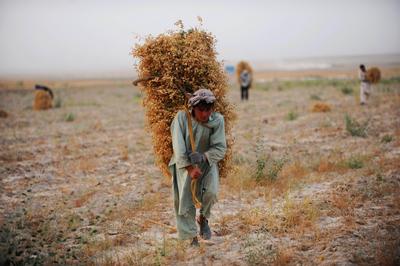So far Japan has been more than willing to offer Afghanistan roads, schools and airports. But its total lack of private investment — despite Afghanistan being one of its leading destinations for foreign aid — means that Japan has not helped create jobs.
Japan is the second-largest donor nation to Afghanistan, surpassed only by the United States, and has been a leading advocate for the new democracy. It has contributed nearly US$5 billion since 2002 and has pledged even more money for the future. Japanese aid workers and project managers are helping to build new infrastructure and schools, and educating teachers, farmers and even new diplomats. The Japanese International Cooperation Agency (JICA) was even chosen to spearhead the ‘New Kabul City’ project designed to double the size of the Afghan capital. But outside of its Embassy staff, JICA members and other aid workers, there are almost no other Japanese in the country — and it is not as if they haven’t been invited.
In 2010, in a move to attract investment and to thank a new ally, Afghan President Hamid Karzai gave a speech welcoming Japan to invest in his country, promising preferential treatment in securing mining rights. He argued Afghanistan, with mineral reserves estimated to be worth between US$1 and $3 trillion, owes Japan a special debt that should be repaid through investment opportunities. The government of Afghanistan, and its embassy in Tokyo, has continued to meet with leading Japanese business officials to push for private investment. So far, though, there is a distinct absence of Japanese businesses in Kabul.
Japan is not inexperienced with linking private investment with development aid. Japanese official development aid (ODA) and other aid programs have long worked in tandem with private investment to create both infrastructure and jobs. Japanese companies have invested alongside aid projects in Southeast Asia, for example, where they helped build, then took advantage of, new roads, ports and power networks. Japanese companies both contribute to and benefit from development. Even more recently, Japanese Prime Minister Shinzo Abe has promised to ‘revolutionise’ Japan–Africa aid policy by focusing on private sector investment, pledging to create nearly 30,000 jobs in Africa over the next five years. Private investment and job creation — as a part of the development aid process — is seen as an increasingly valuable way to stabilise and develop nations while also benefitting Japanese companies.
But despite plenty of offers and increasing investment by European, American and Chinese companies, Japanese officials still respond dismissively towards active private investment in Afghanistan. The leading answer as to why Japan has limited-to-no investment in Afghanistan is of course safety. It is said within Japan–Afghanistan aid circles that Japanese officials in Kabul — JICA and embassy staff included — rarely go out at night or spend free time on the streets out of fear of attack. Japanese businesses — notorious for being risk-averse — fear that attacks would delay or possibly destroy billion-dollar deals, and the Japanese government also no doubt wants to avoid kidnappings, attacks, and the consequences of the potential collapse of the Afghan government. Japan worries that any media coverage of attacks on or kidnappings of Japanese citizens will derail its established aid programs, which are crucial for its political goals in Central Asia. Thus, limiting the exposure to danger is both beneficial to Japan’s agenda and worth the cost of inaction in terms of private investment.
This is where educational partnerships come in. In large part because both economic freedom and literacy rates have risen dramatically in Afghanistan since the fall of the Taliban, hundreds of new schools have sprung up around the country — including 40 new universities in the last 13 years. This is impressive considering only 26 per cent of adult Afghans are literate. Afghan students are already beginning to explore foreign options to enhance their education and newly minted PhD and masters-degree students will be seeking new research positions and networks. Japanese schools make perfect partners. Several Japanese universities, especially women’s universities, have already hosted Afghan professors for training and cultural exchanges. Meanwhile, the first round of Afghan foreign exchange students in Japan graduated in 2012.
Afghanistan is set to see an explosion in college-ready citizens at a time when Prime Minister Abe has promised to increase the number of foreign students studying in Japan, whose own student population is shrinking. While university partnerships and study-abroad exchange programs will not create thousands of jobs for Afghanistan, they will create contacts. Such programs could foster an Afghan-informed Japanese academic community while cementing interest in Japan in Afghanistan’s youth. These people can, in turn, serve as future corporate contacts and experts for companies that may wish to do business in the future.
University partnerships will allow Japan to take the first steps towards private investment. While Japan minimises its security risk and maintains its important aid regime, Afghanistan can capitalise on Japan’s leading educational system and create an interest and knowledge of Afghanistan in future Japanese workers, professors and bureaucrats.
Michael Oeckel holds a Masters Degree in Asia-Pacific Policy Studies from the University of British Columbia. He recently completed an internship at the Afghan Embassy, Tokyo.


Please I want the visa contract me